The political situation on the island of Cyprus is complex. Decades of scepticism, misunderstanding and stalemate has lead to an island literally divided from shore to shore and kept in a peaceful state by the presence international forces.
Despite the tensions, over 4 million tourists still flock to Cyprus each year seeking hot, sunny weather, long stretches of sandy beaches and sparkling, blue Mediterranean waters. Most of them find what they're looking for south of the dividing line in the many resort towns on the Southern coast.
Just 10% of them venture across the border into North Cyprus.
In this post, we're going to assume that you've already considered visiting or, at the very least, you want to know more about this segregated and disputed part of Europe.
Hopefully, we'll be able to satisfy your curiosity and convince you that any visit to North Cyprus will be fun, fascinating, safe and comfortable.
This post contains affiliate links. Find out more in our Privacy Policy.
At a Glance
Jump ahead to a section that interests you most.
- A Brief Modern History of North Cyprus
- Getting to and from North Cyprus
- Transferring from Larnaca to North Cyprus
- Crossing the ‘Green Line’ in Nicosia/Lefkoşa
- Safety
- Language
- Money
- Hiring a Car in North Cyprus
- Public Transport
- Using a Mobile Phone in North Cyprus
- Turkish Coffee
- Vegetarian and Vegan Food
- Photography
- Shopping
- Cats & Dogs in North Cyprus
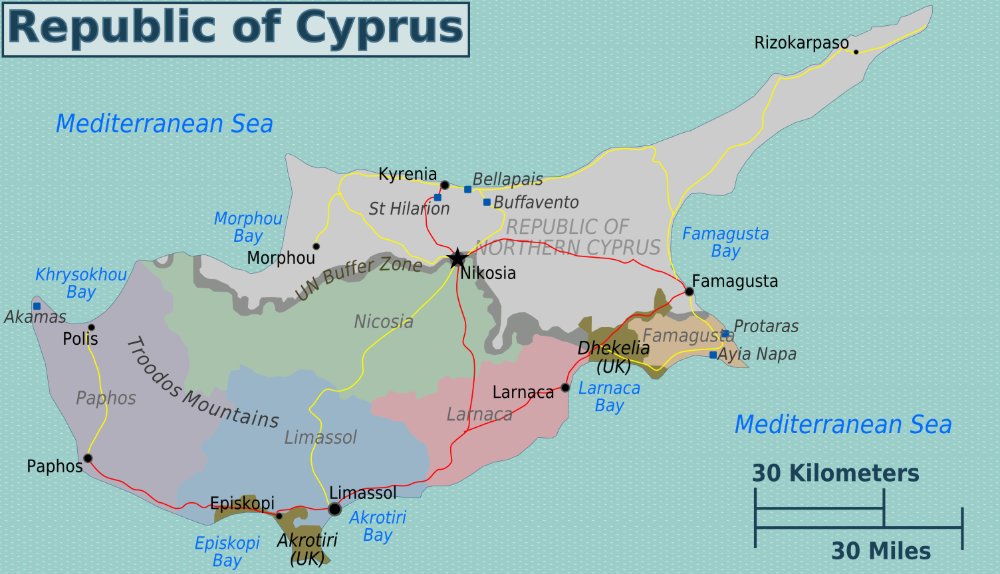
A Brief Modern History of North Cyprus
One year that you'll see and hear plenty of reference to in the run up to, and during your visit is 1974. This is the year everything changed on the island of Cyprus.
It was the year a military coup d'état by the Greek Army was attempted. Turkey's response was to send in its forces, eventually taking control of about one third of the island. Hundreds of thousands of Greek & Turkish Cypriots ended up being displaced from their homes.
By the end of the year, the Greek military junta had collapsed and a ceasefire was agreed. The ceasefire line eventually became a UN buffer zone, which is still in place today.
The Turkish Republic of Northern Cyprus is now the de facto state to the north of the UN buffer zone (or 'Green Line' as it is known). Turkey is the only country to recognise the state, whilst the rest of the international community see's North Cyprus as part of the Republic of Cyprus and Turkey's continued military presence as an illegal occupation.
Attempts to find a solution to the Cyprus dispute have so far been unsuccessful.
Disambiguation: In this post, I will refer to land to the north and south of the UN buffer zone (or 'Green Line') that divides the island. In order for readers to easily differentiate between the two, I will refer to the land to the north, the de facto Turkish Republic of Northern Cyprus, as North Cyprus and the land to the south, the de jure Republic of Cyprus, as Southern Cyprus.
So, now that you know a little about how North Cyprus came to be, let's dive into the details. Here's a summary of everything we think you should know before visiting North Cyprus.
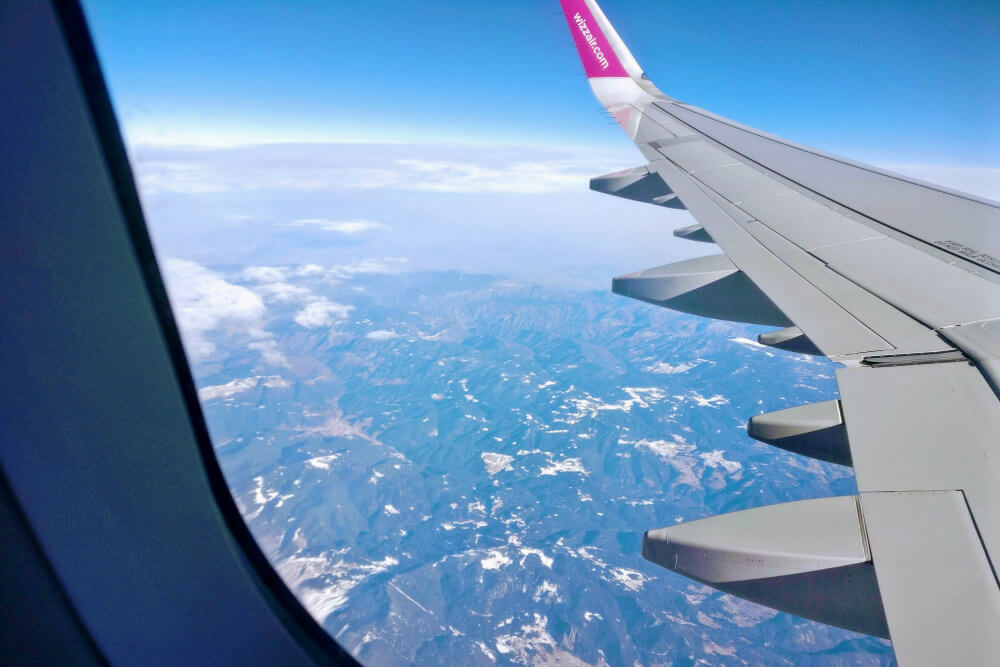
Getting to and from North Cyprus
Ercan International Airport is the primary international airport in North Cyprus. Despite flights to the airport being internationally banned, aeroplanes do come and go, though only via Turkey.
The government of the Republic of Cyprus, who governs the area to the south of the UN buffer zone, considers anyone who has entered via Ercan airport to have entered the country illegally. This is certainly worth considering, especially if you’re keen to visit Southern Cyprus during your visit. You may encounter serious problems if you attempt to cross the border.
While you'll find flight prices are pretty unbeatable to and from Ercan, you'll find options with more flexibility and considerably more direct flights to and from Larnaca airport* in Southern Cyprus.
Skyscanner* is a great place to start your search for the best prices on flights to Cyprus. They compare fares from multiple airlines and travel agents all at once and they make finding more eco-friendly operators very easy.
Transferring from Larnaca to North Cyprus
We had pre-arranged a transfer from Larnaca airport to our hotel in North Cyprus via the Pyla/Pergamos crossing point. Starting on the Greek side, our car crossed through British Sovereign Base Area territory (land containing a British military base) and then the UN buffer zone (though you wouldn’t have necessarily noticed). Our car stopped only once at the Turkish checkpoint where our passports were inspected. Pretty uneventful.
One the way back, our passports were checked again by Turkish forces as we left. The car then stopped again as we re-entered the British Sovereign Base Area, where we were questioned by a customs official about our luggage. The questions were mildly confrontational, perhaps demonstrating the tense atmosphere between the two sides. It was certainly weird for us as Brits to be questioned so rigorously by someone effectively working for the UK government.
One important thing to remember is to keep any transfer papers with you. If you’re not asked to complete a transfer form by your transport provider, don’t worry. If you are though, keep hold of it, as you’ll be asked for it on your return journey.
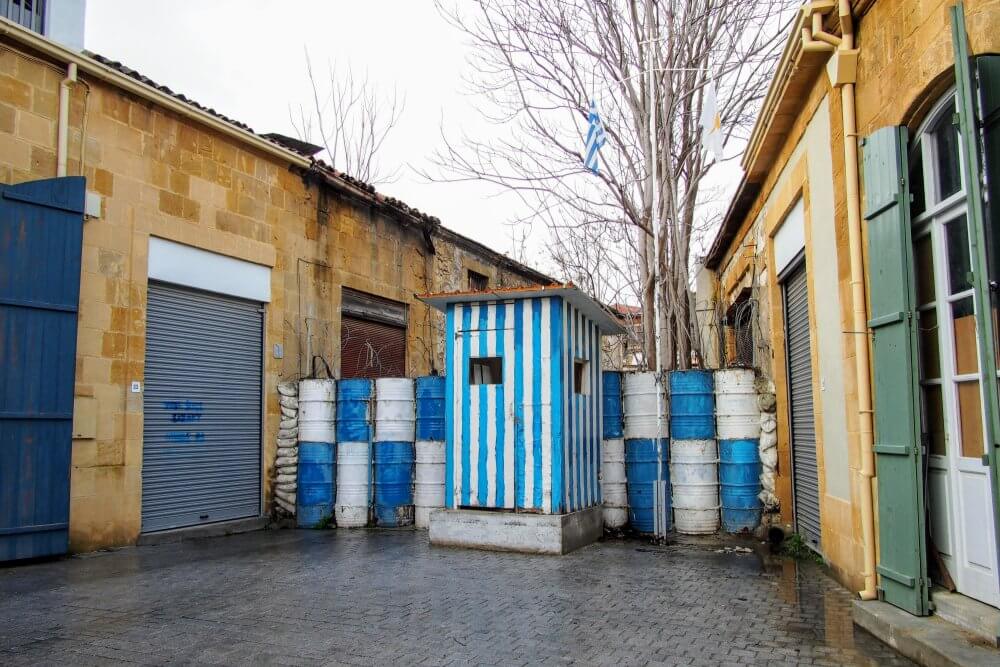

Crossing the 'Green Line' in Nicosia/Lefkoşa
One of the most common border crossing points between the two sides of Cyprus is on Ledra Street in the capital, Nicosia/Lefkoşa. Here, you’ll find a fairly relaxed-looking pedestrian-only border crossing where you’ll be asked to present your passport by both police forces. The process is very easy and you’ll be across the border in minutes.
A less frequented, but significantly more interesting border crossing point can be found on Markou Drakou, often referred to as the Ledra Palace crossing. Here, the UN buffer zone thins to a road’s width and flags from both sides can be seen flying almost side by side. It’s one of the few places where you can wander into the UN buffer zone unopposed.
Just before the crossing itself is the Ledra Palace Hotel, formerly the capital’s largest and grandest hotel, now marooned in no-man’s-land and repurposed as a UN headquarters. Opposite the hotel is Home for Cooperation, an awesome cafe and cultural building whose main purpose is to serve as a place Cypriots living on both sides of the Green Line can meet, have a coffee and engage in cultural performances.
It’s a truly unique place and well worth stopping by.
You might like: North Cyprus: 15+ Incredible Things To See In Europe’s Unrecognised State
Safety
Despite political tensions, an often-noticeable military presence and geographic proximity to troubled areas, North Cyprus is currently perfectly safe and a vast majority of visitors will experience no problems during their visit.
The political situation is somewhat tense, but not violent. Crime numbers are relatively low for a European destination and statistically lower than those in Southern Cyprus. Just exercise the same caution as you would during a trip to any other European destination and you’ll have nothing to worry about.
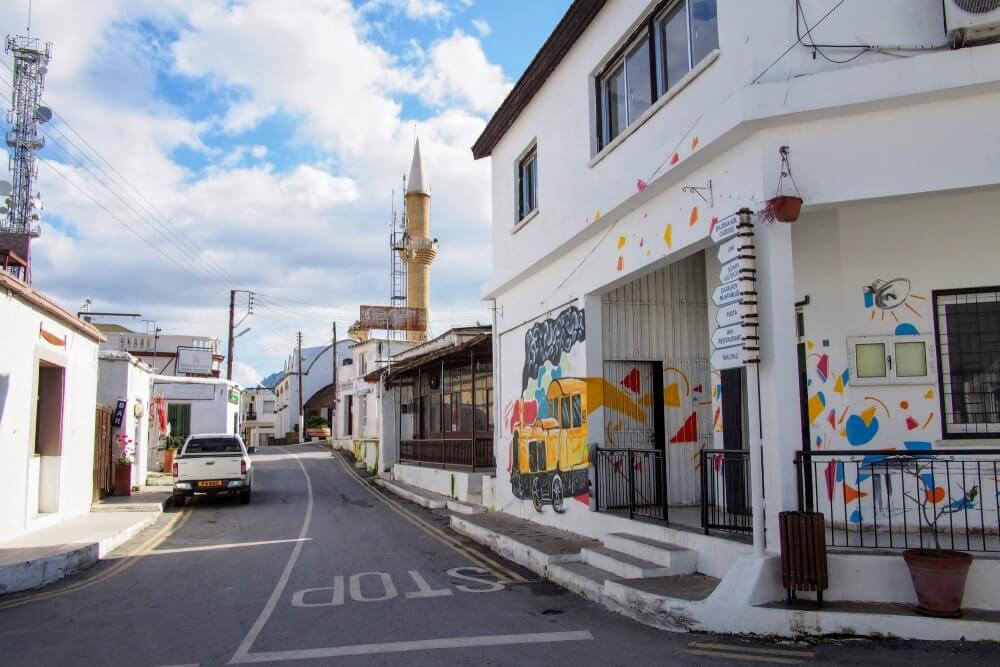
Language
The main language in North Cyprus is Turkish.
Most people know or understand some English, or know someone who does whom they can ask for help. Service staff in shops, restaurants and hotels speak good English.
Road signs, signposts and notices are generally written in both Turkish and English and occasionally Greek. German is also quite prevalent.
Place Names in Cyprus
Since Cyprus has two main influential ethnic groups, many towns and cities in North Cyprus are known by two names, one of Greek origin, the other of Turkish. For example, the popular tourist town of Kyrenia (Greek origin) is also known as Girne (Turkish), while the capital Nicosia is also known as Lefkoşa.
It seemed during our visit that there’s not a lot of consistency with the usage of the names. Road signs generally displayed both names, but older signs only displayed the Greek variant and newer signs only displayed the Turkish. Dolmus buses (see below) generally only displayed their destinations in Turkish.
Since there’s no consistency, it’s good practice to know names in both languages, just in case.
Money
The unusual political situation in North Cyprus means there’s also an unusual monetary system in place.
The de facto currency in North Cyprus is the Turkish Lira, though Euros, US Dollars and British Pound Sterling is also widely accepted. Despite all of the options, we recommend paying only in Turkish Lira as this option almost exclusively offers you the best value.
In more touristy areas, prices may be displayed only in Euros to cater to those crossing from Southern Cyprus. If that’s the case, just ask staff what the price is in Turkish Lira.
Card payments are accepted in larger shops and restaurants with smaller outlets accepting only cash. It is always wise to have cash on you, just in case.
ATMs can be found easily in built-up areas and most of them accept foreign cards. Almost all of them offer English language options, though a small number don’t which can be a bit tricky. Occasionally, we found our cards were politely rejected, but there was normally more than one ATM in the vicinity from other banks that we could try. Most ATMs dispense only Turkish Lira, though some also dispensed both Euros and British Pound Sterling. Typically, getting cash from an ATM will work just as it does at home.
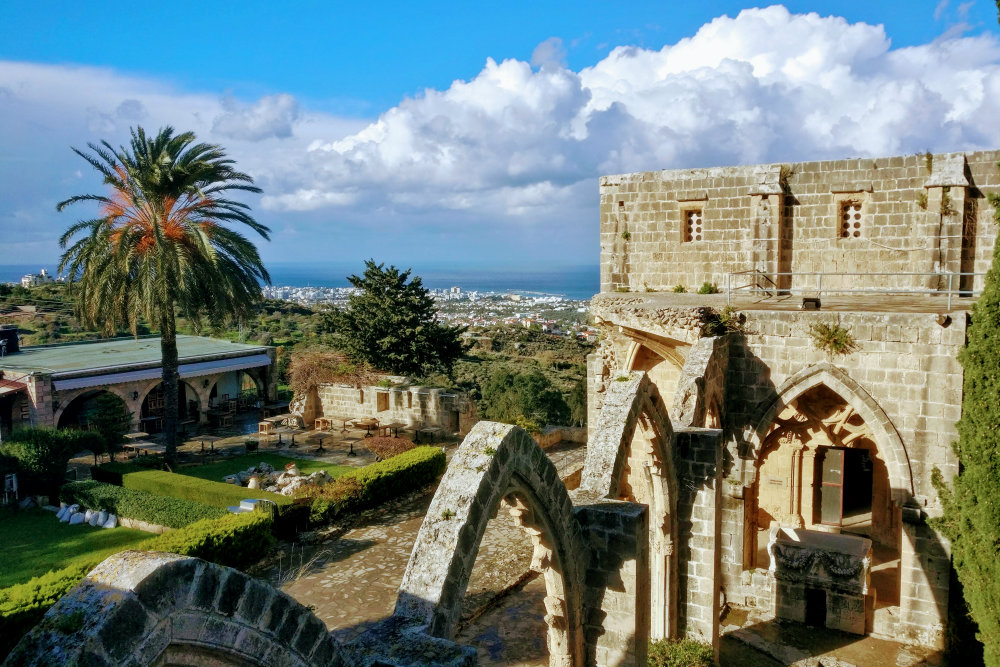
Hiring a Car in North Cyprus
Hiring a car in North Cyprus is just as straightforward as it would be in any other European country. You can do it on the spot at service desks and hire centres, you can ask you hotel to arrange it for you or you can pre-book online. Generally, pre-booking online gets you the best deal and gives you piece of mind that everything is sorted out before you get there.
We used a company called Pacific who are based in Kyrenia/Girne. We were pleased with their prices and their fair fuel policy. They delivered the car directly to our hotel on time and collected it when we were done.
Search and compare car hire prices in North Cyprus with Discovercars*
Car Insurance
Hiring a car in Cyprus has one additional complication that you’ll need to think about. Generally speaking, car’s hired in the south can only be driven in the south and cars hired in the north can only be driven in the north. There are some companies that offer additional insurance policies for both territories, so look into that if you’re planning on driving across the border.
Driving
As a result of former British colonial rule, drivers across Cyprus drive on the left. When hiring a car, expect the steering wheel to be on the right hand side.
Road signs are the same as those found across Europe with additional information written in Turkish and English. Place names are written using a mixture of Turkish and Greek, so it’s best to know both variants of your destination’s name. Speed limits are pretty well signposted, but the end of temporary speed limits aren’t, leading to some guess work being required. The presence of speed cameras is very well signposted, but the cameras themselves are not painted yellow as they are elsewhere in Europe, so watch out.
Getting a driving license in Cyprus is relatively easy, which regrettably means driving standards are pretty poor. Unless there’s a speed camera, speed limits are not strictly adhered to and there’s a relaxed attitude to the rules, particular on dual carriageways and when turning onto a road. A defensive driving style is best adopted to avoid any accidents.
On the plus side, roads are relatively quiet outside town centres and particularly outside of the Spring/Summer months when their are fewer tourists.
Driving with GPS
We used Google Maps on our mobile phone to help us navigate North Cyprus' road network. We found that, on the whole, the directions we were given were accurate, though there were some occasions where we were sent up steep, single track roads to nowhere. We recommend scrutinising your route before you set off to ensure the same doesn't happen to you.
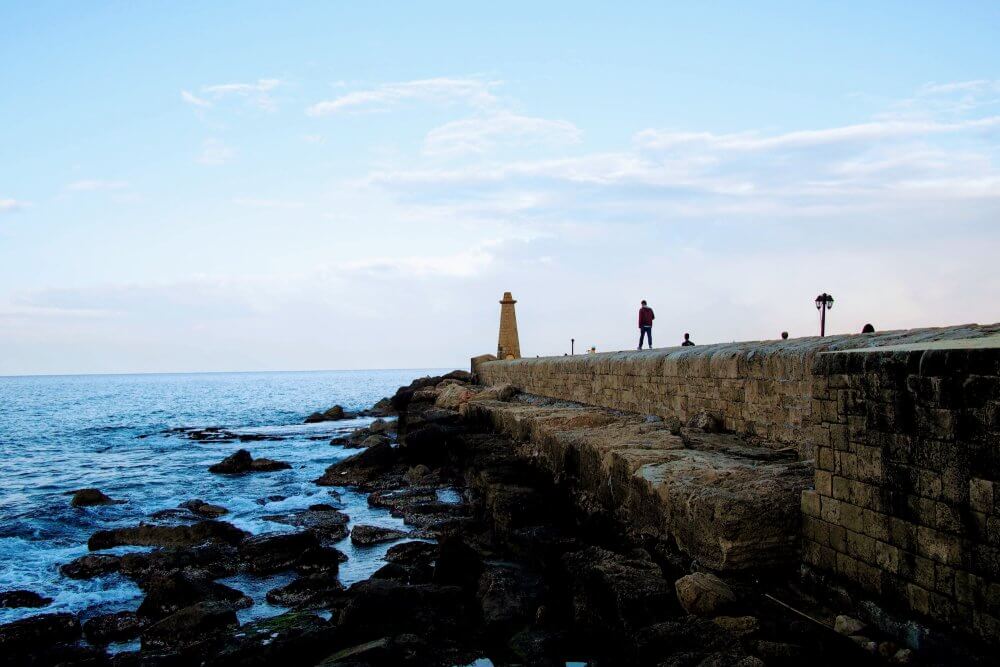
Public Transport
While we recommend hiring a car if you can, getting to and from the main towns and cities of North Cyprus via public transport is pretty easy.
Dolmus Buses
Privately-owned Dolmus mini buses (also known as kombos buses) serve predetermined routes all over the territory. The buses come in all shapes and colours, but are mostly ageing white/cream Ford Transits. If you see one, you can flag one down anywhere along the route or at bus stops (in larger towns). You’ll see the origin and destination displayed in the windscreen. Whenever you wish the bus to stop along the route, simple let the driver know.
There are no timetables, but buses run surprisingly frequently, particularly near larger towns. Services normally run up until 1900, after which services are either few and far between or stop altogether.
Fares are cheap, somewhere between 2-5 lira for local services, and up to around 10 lira for longer distances. Typically, you pay the driver just before you alight the bus at your destination. Make sure you have plenty of change.
On longer distance journeys, you might find things run a little differently. On a journey from Kyrenia/Girne to Nicosia/Lefkoşa, we found a makeshift ticket office set up alongside the row of buses at the bus station, where two friendly chaps were selling tickets and answering questions. Our tickets were checked by an inspector who boarded the bus from a layby, halfway to the capital.
Our best advice when using Dolmus buses in North Cyprus is to go with the flow and don’t be afraid to ask questions.
If you're not hiring a car during your visit, Nicosia/Lefkoşa is probably the best place to base yourself, as you can travel to almost everywhere in the territory by Dolmus from the capital.
Taxis
There are plenty of taxi companies in North Cyprus, particularly in and around larger towns. Depending on the firm, you can book a taxi by phone or online or you can get one at taxi stands or from their hubs. Fares are pretty reasonable by European standards.
Sharing taxis is very common in North Cyprus, with special taxi stands set up for this very purpose. It’s a good way of saving money. There's no pressure to do so however, so don't expect strangers to start piling into your cab halfway through the journey.
Most taxis are metered, but the meters are not often used, so ask the driver how much the fare will be before you get in. We had partial success in negotiating fares, so ask whether the driver will consider lowering the fare by 10 lira or so. If they refuse, judge for yourself whether you think their offer is good value.
Most of our taxi drivers were polite, though driving standards weren't great and it was a bit of a shock to see them answering their phones mid-journey. Doing so is just as illegal as it is elsewhere in Europe, but everyone seems to do it anyway.
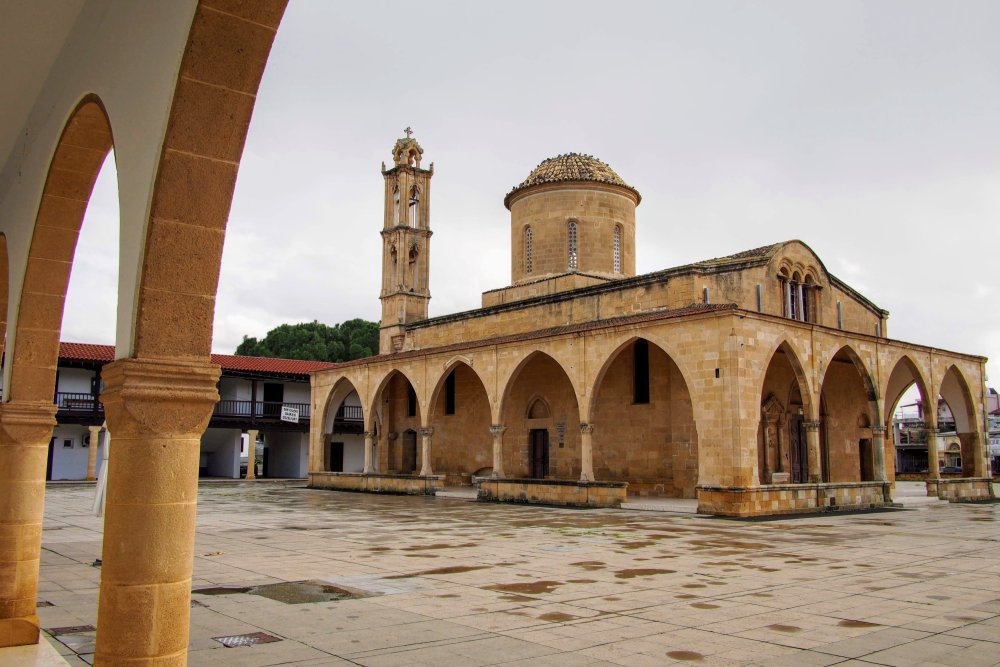
Using a Mobile Phone in North Cyprus
Only two Turkish mobile networks operate in North Cyprus - KKTC Telsim (operated by Vodafone) & KKTC Cell (operated by Turkcell).
You'll find being able to access maps on your phone pretty handy and we found, more than in other European destinations, that calling businesses and restaurants to check they were open was a necessity. We therefore recommend getting a local sim card for use during your visit.
During our visit, we purchased a Tourist SIM from a KKTC Telsim store in Kyrenia/Girne for 50 lira. The sim included 50 international minutes, 500 SMS texts and a huge 10GB of data for 7 consecutive days. Instructions to activate the SIM card were included and were as simple as texting a code to a number. The sim deactivates itself after the 7 day period.
Other pre-paid sims packages are available from the respective mobile network shops or from supermarkets.
EU residents can not take advantage of free roaming in North Cyprus, so keep this in mind if you want to avoid unexpected charges. Network ranges do extend across the 'Green Line' in both directions, so you might be able to stay on a preferred network if you're just popping across the border for a short time.
One way to ensure you don't switch to a different network is by diving into your phone's network settings, switching off 'Automatic' network selection and manually choosing a network instead. Both iOS and Android phones have this option.
Turkish Coffee
Turkish Coffee is very strong and unfiltered and therefore, not for the faint-hearted. If you do want to try it, make sure your purse your lips to ensure you don't drink the coffee grounds.
If you’re wanting to indulge in a local hot drink, we recommend Turkish Tea instead. We drank gallons of the stuff.
Vegetarian and Vegan Food
Most restaurants we visited offered vegetarian options, though in some cases, the options were rather limited. The cuisine you'll encounter is strongly influenced by Turkish and Greek cuisine and thankfully, both of these contain lots of accidentally vegetarian options. If in doubt, always ask which options are suitable for vegetarians. We found everyone we asked was keen to help.
Vegans will have considerable difficulty finding food to eat outside Nicosia/Lefkoşa. During our week-long visit, only one restaurant we visited identified vegan options on their menu. With this in mind, you will want to consider self-catering during your visit.
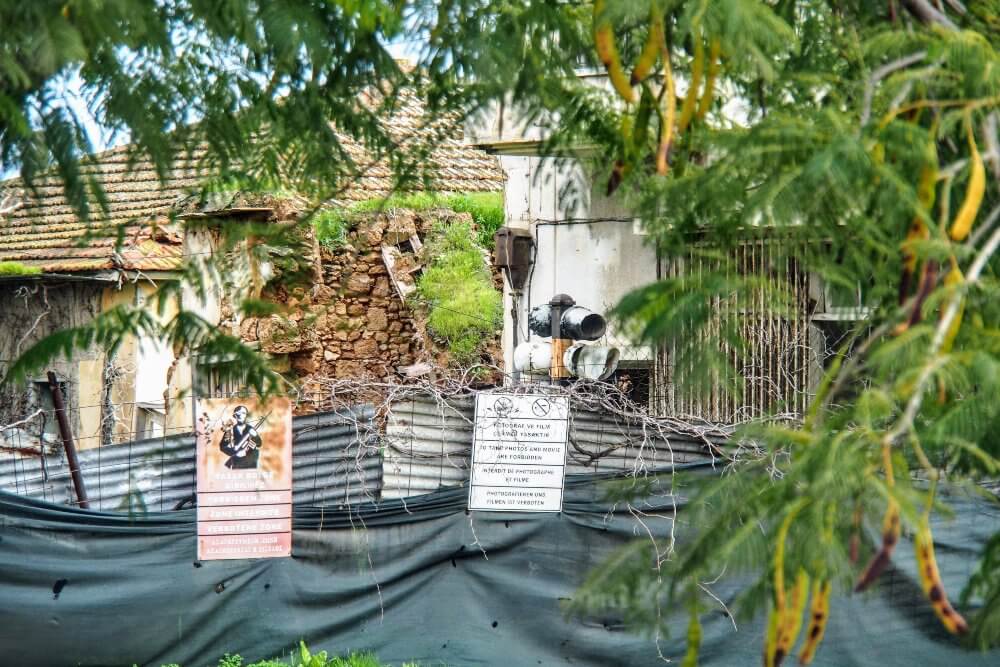
Photography
The Turkish military have a strong, visible presence in North Cyprus. While you are unlikely to see actual soldiers roaming about (except around the 'Green Line' in Nicosia/Lefkoşa), you will likely encounter military bases as you explore the territory. Photography of these bases is not allowed, so keep an eye out for red warning signs signalling you’re near a prohibited zone.
A particularly prominent spot where photography is prohibited is the ghost town of Varosha. Before the arrival of Turkish forces in 1974, Varosha was a thriving tourist seaside town. Since then, the town has been left abandoned and closed to the public. The town can be viewed from a small section of beach near the Arkin Palm Beach Hotel in Famagusta/Gazimağusa.
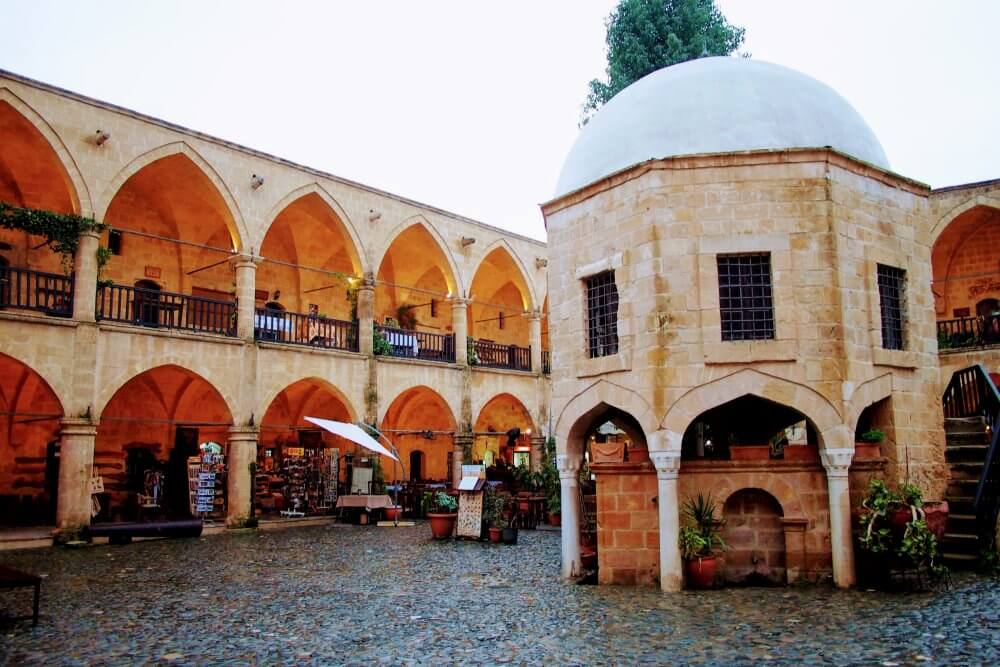
Shopping
Due to the current political situation, North Cyprus is subject to international embargos. Other than Turkish brands, you won’t see recognisable shop or restaurant brands anywhere in the territory. If you do see a recognisable branded shop, it could be counterfeit, so be careful.
The lack of recognisable brands and the strong presence of independent businesses should be considered as a reason to visit North Cyprus. With so much of Europe's shopping scene becoming increasingly identical, it was refreshing and interesting to experience something so different.
Opening Times
Opening times vary considerably with different opening hours during the Summer and Winter seasons. Generally speaking, shops and businesses are open 08.30-18.00, with a 1-2 hour closure/siesta around midday during the Summer.
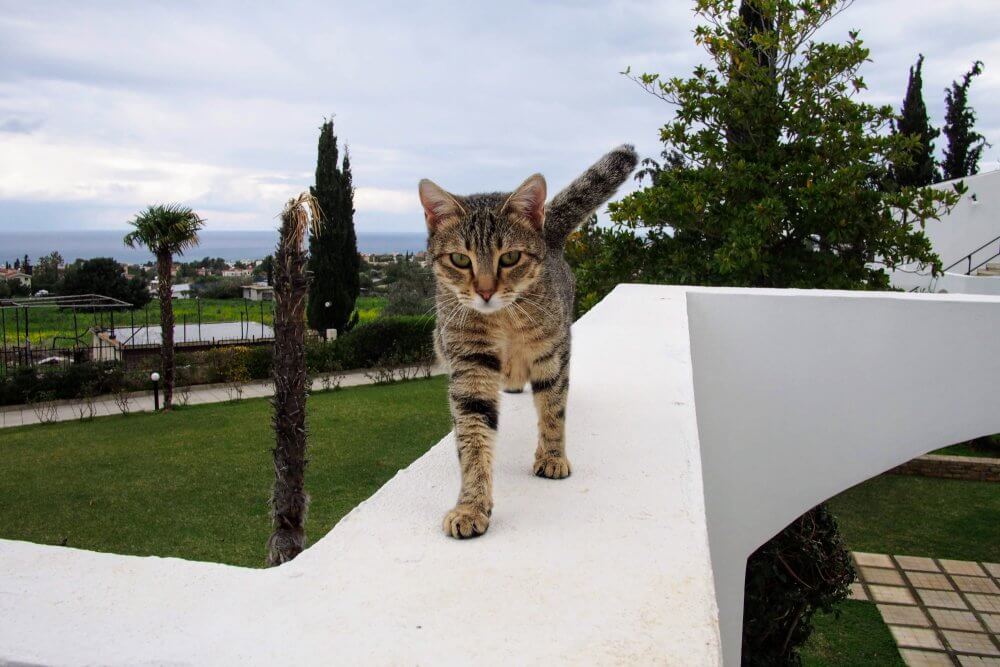
Cats & Dogs in North Cyprus
Stray cats and dogs can be found everywhere in North Cyprus. Groups of dogs can be found lolling about in supermarket car parks & outside tourist attractions, whilst cats can suddenly appear out of nowhere, even inside restaurants and shops.
Almost all of the animals we saw appeared to be in good health and condition, with some having been visibly tagged to show they’d been checked over. None of the animals showed us any aggression and were instead universally sweet-natured. Locals appeared to have a high tolerance for the cats in particular, often holding doors open for them, petting them and feeding them.
Since the animals are free to roam and therefore not inoculated, it’s probably not a good idea to pet them (though we found it pretty difficult to resist).
I hope you've found this post informative and helpful. We've tried our best to be both.
We hope you have an incredible trip to North Cyprus.
Read more: North Cyprus: 15+ Incredible Things To See In Europe’s Unrecognised State - Our massive guide to the entire territory of North Cyprus

I highly appreciates the well explained pictorial descriptions just narrated thanks.
You’re very welcome, Taoridi!
Hi, we’re visiting Cyprus in April. We’re flying in and out of Paphos but we want to visit the north too. Our car rental in the south says we cannot take the hire car to the north. What is the best option? Do you leave your southern car parked near the border and a hire another one on the other side? Any tips greatly appreciated!
Thanks, Annabel
Hi Annabel! I guess it’s whatever works for you best.
I think I would hand my southern rental back the day before I was due to cross the buffer zone. I’d then arrange a transfer across the border, then collect a separate rental on the other side. It depends on how long you’re intending on spending in the North, how much it costs for parking and for the continued rental. If it’s for a day or two, I might be tempted to keep my southern rental. Any longer and I don’t think I’d be able to justify the cost.
HI Annabel
if you couldn’t find a way to take your rented car this side, there are plenty of rental car company in North ,u can pass the border with taxi and they will take u immediately to the rent office,
Hi Annabel, we own a property in the North, and we always use a company called Kem cars, who are located in Larnaca and Paphos airport, they allow you to take the hire car into the north, but you will have to show the paperwork they give you at the border and take out a separate insurance, useually around 18 euro for up to 3 days or 32 Euro for longer. We have used every border, and everything is done quickly and efficiently at each one, the one we use the most is Bostanci , mainly because our property is in a place called Gaziveren , it’s a lovely hours drive from Paphos airport over the Troodos mountains and drop down to border the other side.
I hope that is helpful? And enjoy every minute of it as the people there always try to make you feel welcome.
Cheers Steve
Its not true that you can not cross border with rented car. You just will be asked to buy aditional insurance on the border, whitch will valid in turkish part. You can choose 1 day, 7 days or 30 days insurance as i remember.
Hi I’m sorry we were in north Cyprus (kyrenia) about four years ago and we went to go across the border with our rental car and we’re made to turn around and go back, maybe they changed the rules since we went, but hopefully we are going back this year.
How do the southern cypriots know u entered at ercan airport?
When you enter ‘Southern’ Cyprus, your passport is scanned and logged. If you enter via the North and then cross the buffer zone, authorities won’t have a record of your passport having been scanned and will then, most likely, ask you how you entered the country.
Yo ingrese por Ercan y al cruzar al sur no tuve problemas en la frontera (solo cruce al lado Griego por unas horas a conocer) soy de Chile.
Y todo lo que comentaron es muy útil, y definitivamente hay que darle la opción al lado Norte de visitarlo, es un “pais” diferente y la gente muy amable con el turista
We are due to fly to Northern Cyprus on 5th August For our sons wedding. We can see you the British gov site that we cannot enter northern Cyprus as we are coming from the UK.
Unable to get any clear guidelines from either embassy!
Does anyone know if we can enter Northern Cyprus or will we be refused entry?
Also would be have to quarantine for 14 day’s & go into a place they put us in?
Only there 10 day’s for the wedding!
Any help would be really appreciated
Thanks
Toni Nigrelli
Hi – you can come to Northern Cyprus, but will be subject to seven days government quarantine for which you pay at (probably) Malpas hotel and food will be delivered to your room, which you cannot leave. Currently, only alternative is to spend 15 days in Turkey – then you will only be quarantined until your Ercan PCR is confirmed negative. This info as of today – Sunday – good luck 🤞. You cannot come via South at moment.
You can only fly to Ercan with mandatory seven day government quarantine. If you spend 15 days in Turkey first, you can enter via Ercan and just have 24 hr quarantine to confirm negative PCR.
Can I travel from North Cyprus to Slovenia and Slovakia on a student visa. What should be the worst case scenario? Thanks
I am due to travel October to North Cyprus for my study. I would like to know if its a wise decision considering this covid 19 situation and in general would like to know if as a student in north Cyprus one can work while schooling.
Hello,
I am aware that you cannot fly into northern Cyprus and then cross the boarder, however does this apply the other way round? Am I able to fly into the South stay for 14 days and then cross the boarder to fly from Ercan? I need to get to mainland Turkey after my visit to Cyprus. I am a British citizen… Any advise would be very much appreciated!
Thanks
This was extremely helpful. Thank you!
wow! That was a lot to read and very informative. I will send it to my friend to read, he wants to study in Cyprus and l just want him to know more about this county Thank you for this article!
North Cyprus is a hidden gem! I have been quite a few times now directly from England via Turkey, it is the best way and less hassle. I also managed to book my accommodation and car hire online and always pick up the car from Ercan Airport. My partner and I have love going there since our discovery because of the warm climate, lovely and friendly people, peaceful and quiet destination with beautify scenery. It’s a great place to become mindful and to chill out. We highly recommend the destination and hope to go again after quarantine is over.
As a UK citizen I am now only allowed in the EU for 90 days in 180. If I visit Northern Cyprus from Turkey do the days I stay count towards my 90 days allowance.
Thanks
According to the FCO website, “The Republic of Cyprus authorities may count time spent in the north of Cyprus towards the 90 day visa free total. If you overstay, you may potentially face difficulties at the airport on exit or re-entry.” In short, as with most of the new laws and regulations being imposed on UK citizens, who knows!?
Looking forward at some time to coming to northern Cyprus would like to find out about short rentals 3 months at a time so we can go between Uk Cyprus and spain
We are looking at relocating to North Cyprus , what are the pitfalls and does the ninety day rule apply. T I A